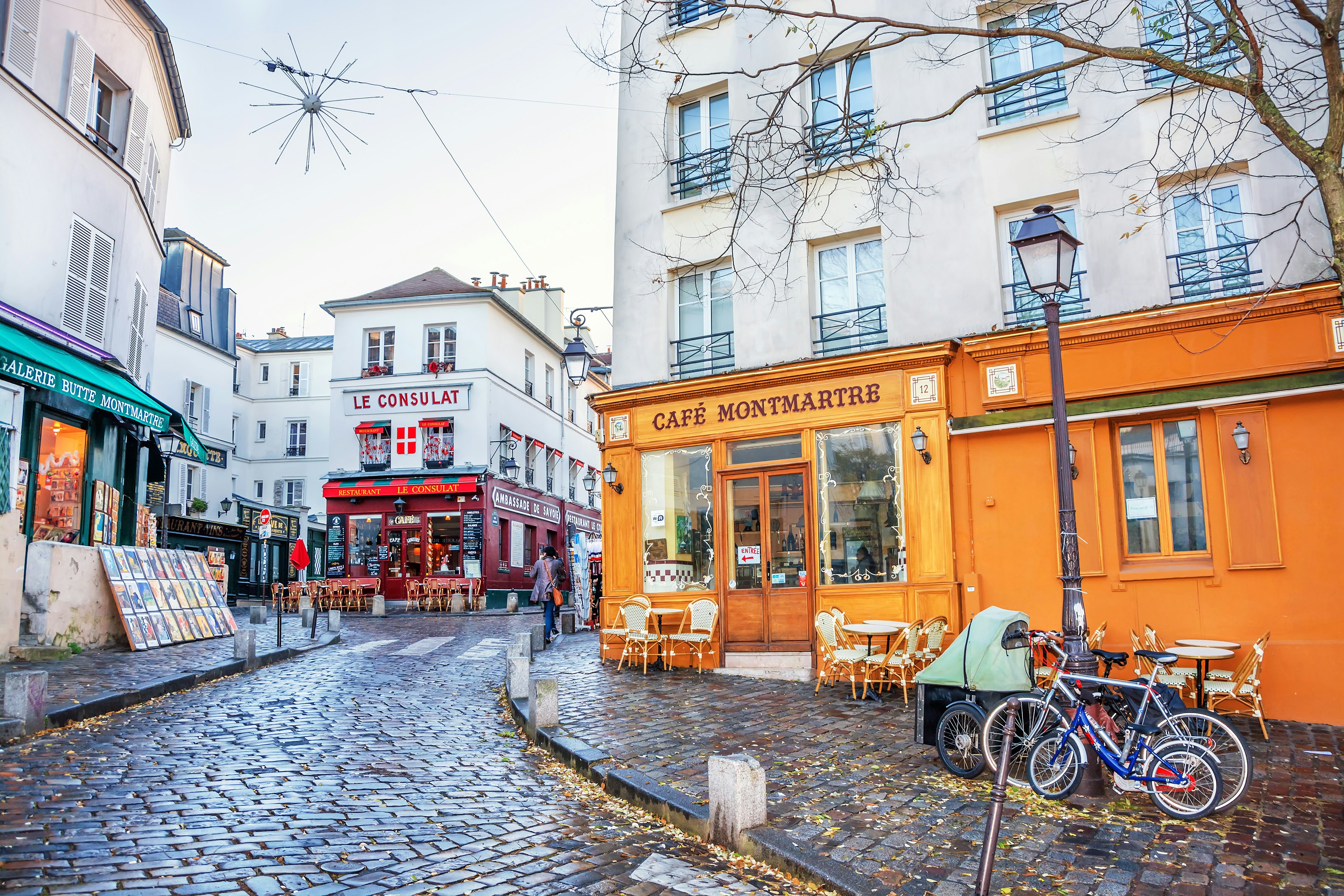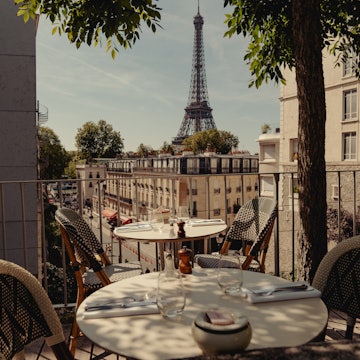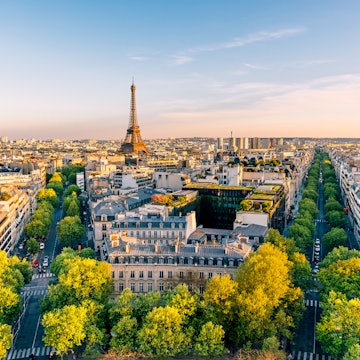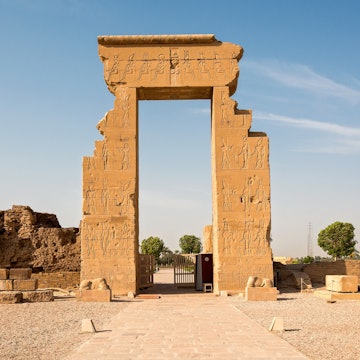

Picnic at the Champ de Mars. Symeonidis Dimitrios/Shutterstock
Fabienne is a Paris local and one of the authors of our latest Paris guidebook. Here, she shares what you need to know before visiting Paris for the first time.
Paris is bustling, diverse and surprising. Given that, first-time visits may seem challenging. And, even after nearly 20 years of living in Paris, I still encounter nuances in the local lifestyle, constantly learning new-to-me Parisian peculiarities. (Who knew you could be fined for walking the wrong way in a Metro corridor?) To save you from the same, rely on these practical tips and cultural insights.
1. You'll want more time in Paris than you think
A glimpse of Paris can be caught in just a couple of days, but to truly experience this busy city's diverse activities, sights and experiences, five days to a week is ideal. Paris can be enchanting year-round, yet it's worth noting that August is the traditional holiday period in France, which might mean the city's a lot sleepier than other times of the year.

2. Book main attractions in advance
With limited time, pinpoint in advance the main attractions you want to visit. Booking online for museums, exhibitions or theater performances will save you a lot of time waiting in lines. Remember, Parisians enjoy their museums as much as tourists do, so visiting on weekdays and starting early can significantly change your experience of busy landmarks.
3. Leave some time to wander
If you’re comfortable leaving part of your time in Paris without a firm itinerary, stroll until you find yourself surprisingly lost. It will allow you to discover the unique identity of each arrondissement (district), which is shaped by various layers of history. With most landmarks concentrated in the city center, it's easy to wander and never get bored. In fact, there's even a French word for this approach to experiencing a place: flâner.
Traverse from the upscale Champs-Élysées to the tourist-packed St-Michel, then to the trendy Le Marais and the more bohemian Belleville, all within the city's boundaries (though you may not realize it!). For deeper insights, consider themed tours (food, culture, history, street art, architecture, etc). Many Parisians are eager to share their city with visitors, and it’s a great way to get first-hand insider tips.
4. Dress like a Parisian
Wear something comfortable; Paris is a walking city. While dark clothes will generally help you blend in with the Parisians (and deter pickpockets), if you like bright colors or dressier clothes, that works, too. This is the home of couture, after all.
5. Personal space is important
More important – if you wish to blend in – be mindful of personal space, especially on public transportation. The golden rule when navigating Paris, particularly on the Metro and RER (suburban train network) is to be unobtrusive.
During busy times, especially at rush hour (from 7am to 9am and 5pm to 7pm), put your backpack or luggage down and avoid using fold-down seats. When the carriage is full, it's better to wait a few minutes for the next train. Always keep to the right on corridors and escalators, and have your ticket or Navigo travel pass handy for frequent ticket barriers and control.

6. Get familiar with café culture etiquette
The best places to experience Paris and its people are at cafés. Take a moment to rest on a terrasse – cafe tables on the street – to people-watch while planning the next part of your day. Just grab a table and seat yourself; servers will come and attend to you. Bills are often left with the order on the table, but payment isn't expected immediately unless explicitly stated. Tipping isn't required but is always appreciated.
It's not uncommon to exchange a few words with people at neighboring tables, but it's equally normal and acceptable to keep to oneself, despite the proximity of seating (as most establishments maximize their use of pavement space). Smoking tobacco is widespread in France, particularly at outdoor cafés. Indoor smoking is prohibited by law; so if you're wondering whether smoking is allowed, look for ashtrays on the tables. Additionally, Parisians generally value discretion, so loud voices might attract disapproving looks.
7. Try and speak French, even a little
If you're lost or need directions, don't hesitate to ask a local. Despite the hustle, Parisians will generally stop to help and most can provide basic directions in English. The phrase "Excusez moi, parlez vous anglais?" ("Excuse me, do you speak English?") is the best way to get someone's attention. It's also polite to greet and say farewell (bonjour during the day, bonsoir at night and au revoir as you're leaving) to anyone with whom you interact, such as shopkeepers and hotel staff.
Should you befriend locals, don’t be surprised to see them make a move towards your cheeks. La bise – giving kisses on the cheeks (two in Paris) – is the most common greeting among friends, including between men. However, as a foreigner, you won’t be expected to do it spontaneously.
8. Bus and tram services are more accessible than the Metro
The few Metro stations that have elevators are indicated on Metro maps. Wheelchair users or those traveling with a stroller may find it easier to travel by bus or tram, as they are more spacious, at street level and are usually equipped with ramps.
9. Always keep an eye on your belongings
Wherever you go, watch out for your personal belongings, as pickpocketing is a risk on the Metro and near popular tourist sites. Scammers may approach you with a petition to sign or items for sale, distracting you from a potential pickpocket accomplice. A "lost" jewel or banknote on the street is another distraction scam.
In some tourist areas, you might encounter people trying to place a bracelet on your wrist and then demand payment. In all cases, politely decline any unsolicited interaction and walk away. Souvenirs sold by street vendors, including plastic souvenirs at the bottom of the Eiffel Tower, are often significantly overpriced compared to those in shops.

10. Crossing roads can be complicated
Some roads in Paris are shared, and cars, taxis, delivery trucks, bikes, scooters, motorbikes, skaters and pedestrians are expected to coexist in busy spaces. Although the French drive on the right, be aware that bicycles and scooters may use dedicated lanes that sometimes run counter to the traffic direction or merge with pedestrian walkways. They're not always visible, so watch out in all directions before stepping into the road.
11. Paris is generally a safe city
Fortunately, Paris is a safe city overall. In localized areas in the northeast of Paris, there can be occasional criminal activity, typically at night. As a tourist, you're unlikely to be targeted for violent crimes based on race or origin, especially when sticking to central attractions. If you need transportation late at night when the Metro isn't running (it stops between midnight and 5am on weekdays, and from 1:30am on weekends), it's safest to call a taxi or use a ride-hailing app.
Paris is welcoming and LGBTIQ+ friendly (Le Marais is one of the historic “gayborhoods” in Paris). Unfortunately, catcalling towards women can happen on the streets or on public transportation, despite efforts in raising awareness. Take reasonable precautions as you would in any big city: watch out for potentially aggressive behavior – particularly from individuals who may be intoxicated or disoriented – on the Metro or in the streets.
12. Every district has its own central police station
As is the case anywhere, things sometimes go wrong. If you run into a situation where you need police help, look for the closest police station. Every arrondissement has its own central office open at all times. Alternatively, dial the European emergency number (112). For the fire department, dial 18.
13. The standard of medical care is high
Should you need medical assistance, Paris has the largest operating public hospital system in Europe with emergency rooms equipped to receive travelers. In case of emergency, dial 15 for the ambulance service. Over-the-counter medicines can be found at pharmacies, which are on almost every street in Paris, with English-speaking staff around tourist areas. A mapping app can direct you to the nearest 24-hour pharmacy.
Take your France trip with Lonely Planet Journeys
Time to book that trip to France
Lonely Planet Journeys takes you there with fully customizable trips to top destinations–all crafted by our local experts.
























